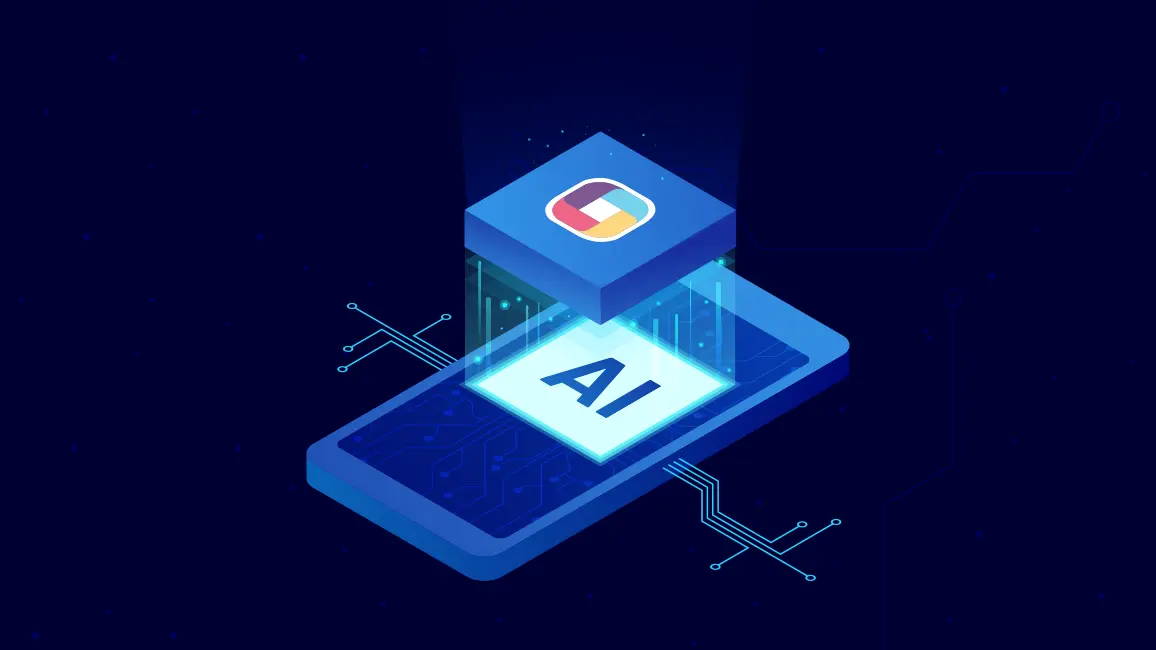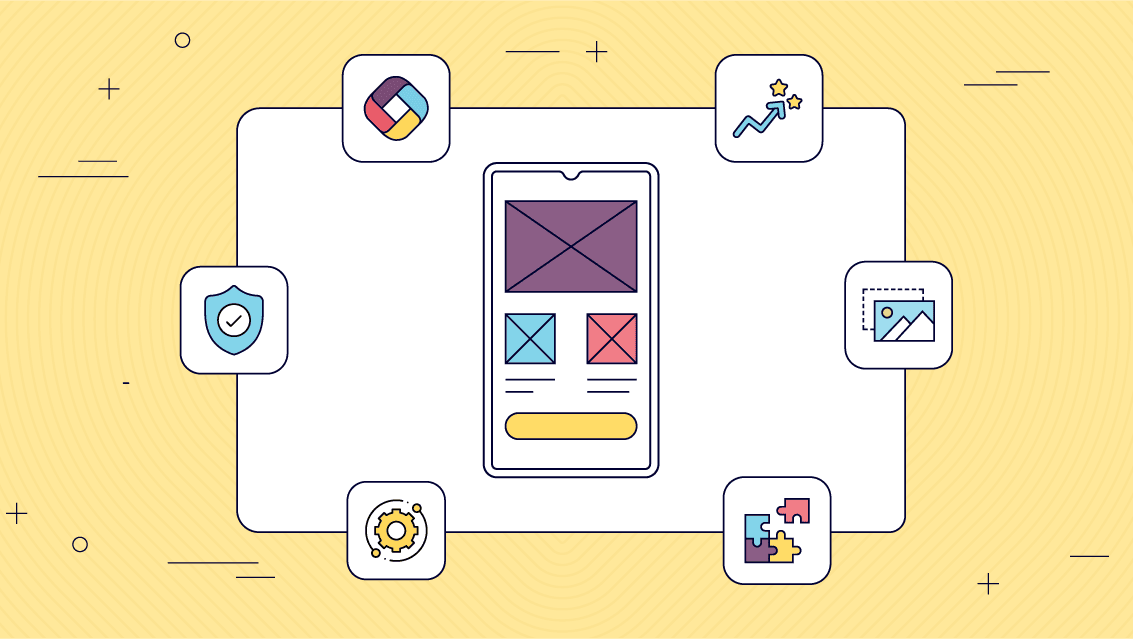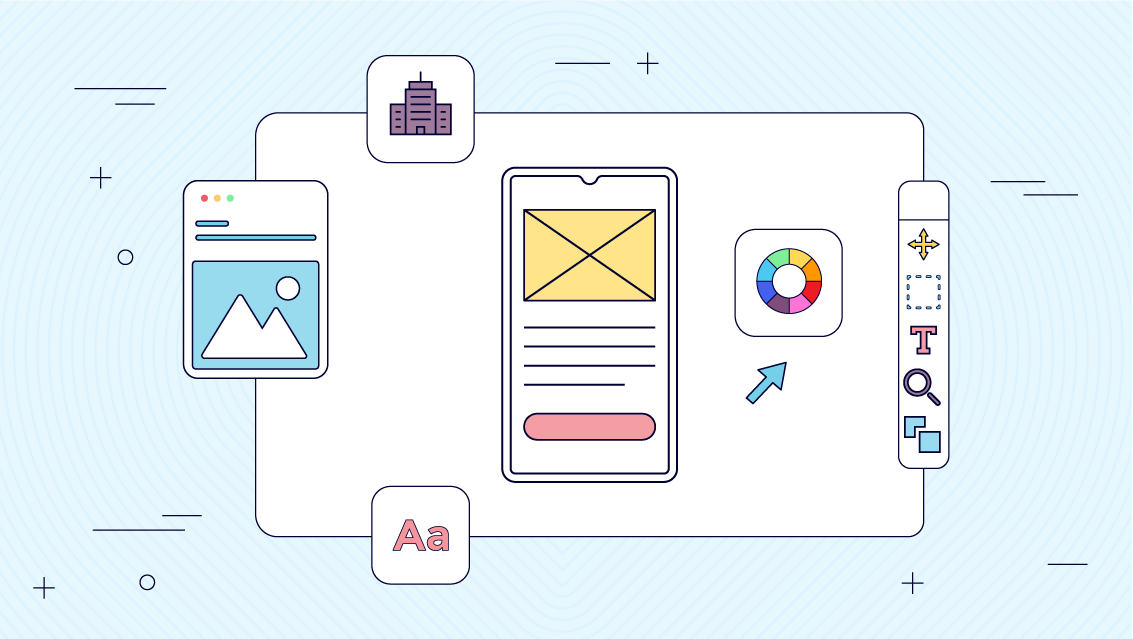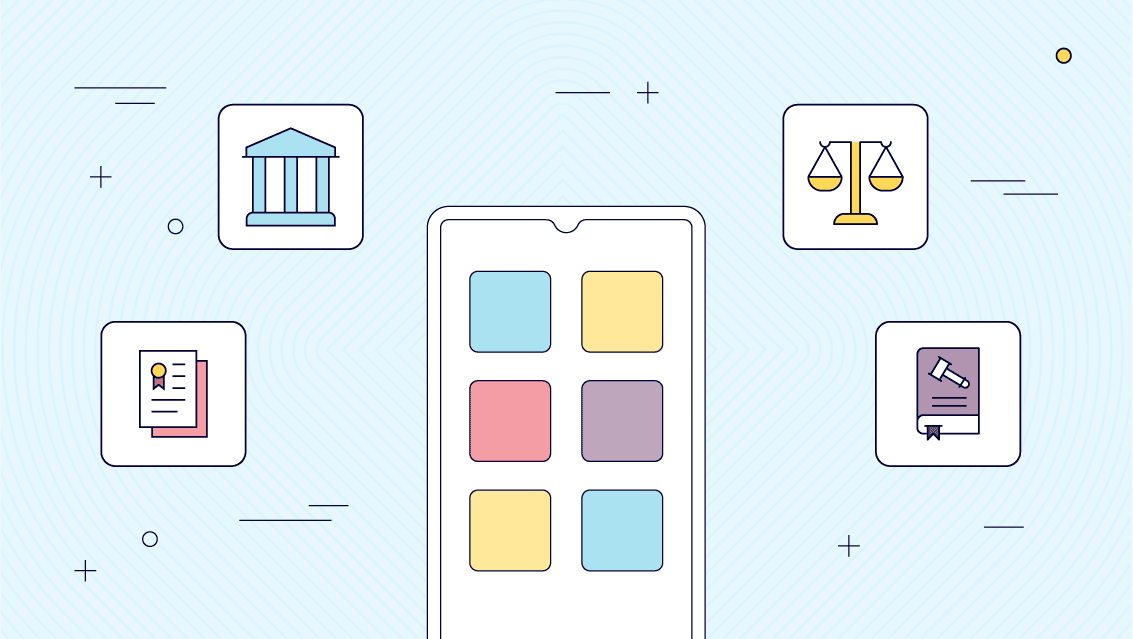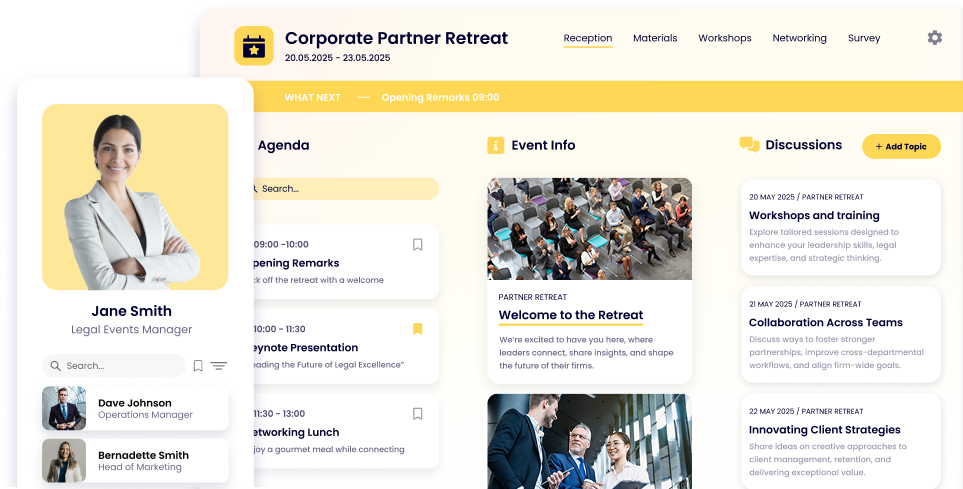How AI Will Disrupt App Development

Niamh Conneely | Marketing Executive
May 23, 2023 ● 20 minutes
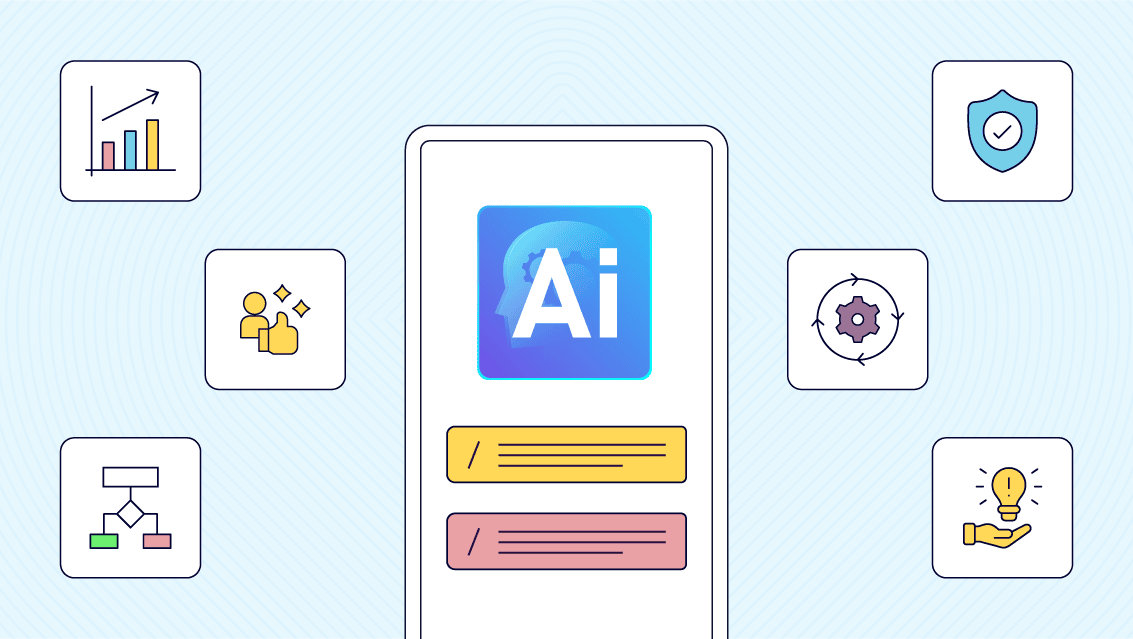
As a no-code/low-code app development platform, we’ve been keeping an eye on AI developments for a while, experimenting with new tools and investigating how to apply them to our work. With the help of the knowledge we’ve gathered, we’ll discuss artificial intelligence in mobile applications in this post and how it’s affecting everything from app consumption to its creation.
Did you know that, by 2030, the usage of artificial intelligence is expected to contribute to a $15.7 trillion rise in global GDP? That’s because, according to Techjury, AI increases company efficiency by roughly 40% in wealthy nations. According to the same research, 77% of individuals utilize at least one product or service with AI-based capabilities.
What is artificial intelligence (AI)?
Artificial intelligence (AI) is the term used to describe how computers, particularly computer systems, simulate human intelligence processes. These include reasoning—using rules to arrive at approximations or firm conclusions—learning—acquiring knowledge and rules for utilizing it—and self-correction.
AI is the ability of a computer or machine to simulate the functions of the human mind, including learning from examples and experience, object recognition, language understanding and response, decision-making, and problem-solving, and combining these and other capabilities to perform tasks a human might perform.
The difference between AI and Machine Learning (ML)
AI and ML are often used interchangeably, but they do have distinct differences.
AI is a broad concept that encompasses any computational program that can mimic human thought or behavior. It involves creating algorithms or models that can solve problems, make decisions, or understand language. AI can be rules-based, meaning it follows pre-programmed instructions to make decisions.
On the other hand, ML is a particular form of AI that enables computers to learn from experience and adapt without being explicitly programmed. It entails developing algorithms that can enhance their functionality or produce precise forecasts based on data. The performance of the algorithms improves with increased data exposure.
In essence, ML involves computers that learn from data and gradually improve their operations or decision-making capabilities, as opposed to AI, which comprises robots that can execute jobs that typically need human intellect. So, while ML is a method to build AI, it is not a component of all AI systems.
The benefits and advantages of AI in app development
Artificial Intelligence (AI), an example of cutting-edge technology, is transforming the landscape of app development. As an innovation that emulates human intelligence, AI introduces impressive potential in creating apps that are more interactive, smarter, and adaptable. The infusion of AI in app development brings with it extensive benefits, significantly enhancing productivity, efficiency, and user engagement.
If you are new to the world of app development take a look at the 10 best mobile application development platforms in 2023 or if you are an enterprise organization read the Top 10 Mobile Enterprise Application Development Platforms.
The top benefits that AI applications offer to organizations
- User Experience Enhancement: AI can tailor the user experience in AI apps by studying users’ interaction patterns, preferences, and behaviors. It delivers intelligent recommendations and personalized content, which ultimately boosts user engagement and satisfaction in the AI app environment.
- Problem-Solving Efficiency: AI algorithms in app development serve as effective problem-solving tools. They have the capability to process an enormous amount of data, pinpoint patterns and trends, and make data-driven decisions. This functionality significantly optimizes the app’s performance.
- Task Automation: AI shines in executing repetitive tasks. Automating these mundane tasks with AI applications not only escalates efficiency and productivity, but it also allows developers to concentrate on more intricate aspects of the app development process.
- App Security Enhancement: AI brings a significant improvement to app security. Machine learning algorithms within AI apps can detect potential threats and unusual behavior, thereby offering an additional layer of security.
- Data-Driven Decision Making: AI algorithms have the potential to analyze and decode complex data, providing valuable insights that drive decision-making. These AI applications lead to the development of more efficient strategies and resource utilization, making them crucial artificial intelligence examples in the tech industry.
- Revenue Boost: By delivering a personalized and engaging user experience, AI apps can increase user retention and conversion rates, thereby significantly amplifying an app’s revenue generation potential.





Advantages of AI in Mobile App Development:
The surge in AI tools has meant app development can be faster, simpler, and more accessible.With its ability to analyze large amounts of data, learn from patterns, and make decisions, AI brings significant advantages to both users and developers. Here, we delve into some of these advantages, categorized for users and developers.
Advantages for Developers
1. AI-Driven App Design: AI tools can help in the design phase of app development, creating visually appealing layouts and interfaces based on user behavior and preferences. This results in an attractive and user-friendly application. Midjourney AI can generate some pretty impressive mobile app user interface concepts for you. It is useful during early design stages of app development as you can get a grasp of the visual aspects of your app.
Another example is Locofy which brings together front end design and code to produce a mock up, up to ten times faster. This AI software improves the efficiency for developers and reduces the time it takes to create app prototypes.
Here is an example of how someone created an app design with ease using AI.
2. Intelligent App Icon Design: AI can even help in designing app icons, creating engaging and unique icons that attract users and boost app downloads. For example, you can use Midjourney to create app icons, mock ups and other AI artwork. Midjourney is an AI company that allows you to easily and quickly generate images and designs based on text prompts.
Another example of how App Icons can be generated using AI.
3. Automated Code Generation: AI can automate some aspects of coding, reducing the time and effort required in the development process. It can suggest code snippets, identify errors, and even provide solutions to common programming issues.
You can ask AI to assist you with code whether that be bug fixes, optimizations and API’s and integration. Say a prompt to AI and it will give you the code. This can save developers a huge amount of time and effort. For example:
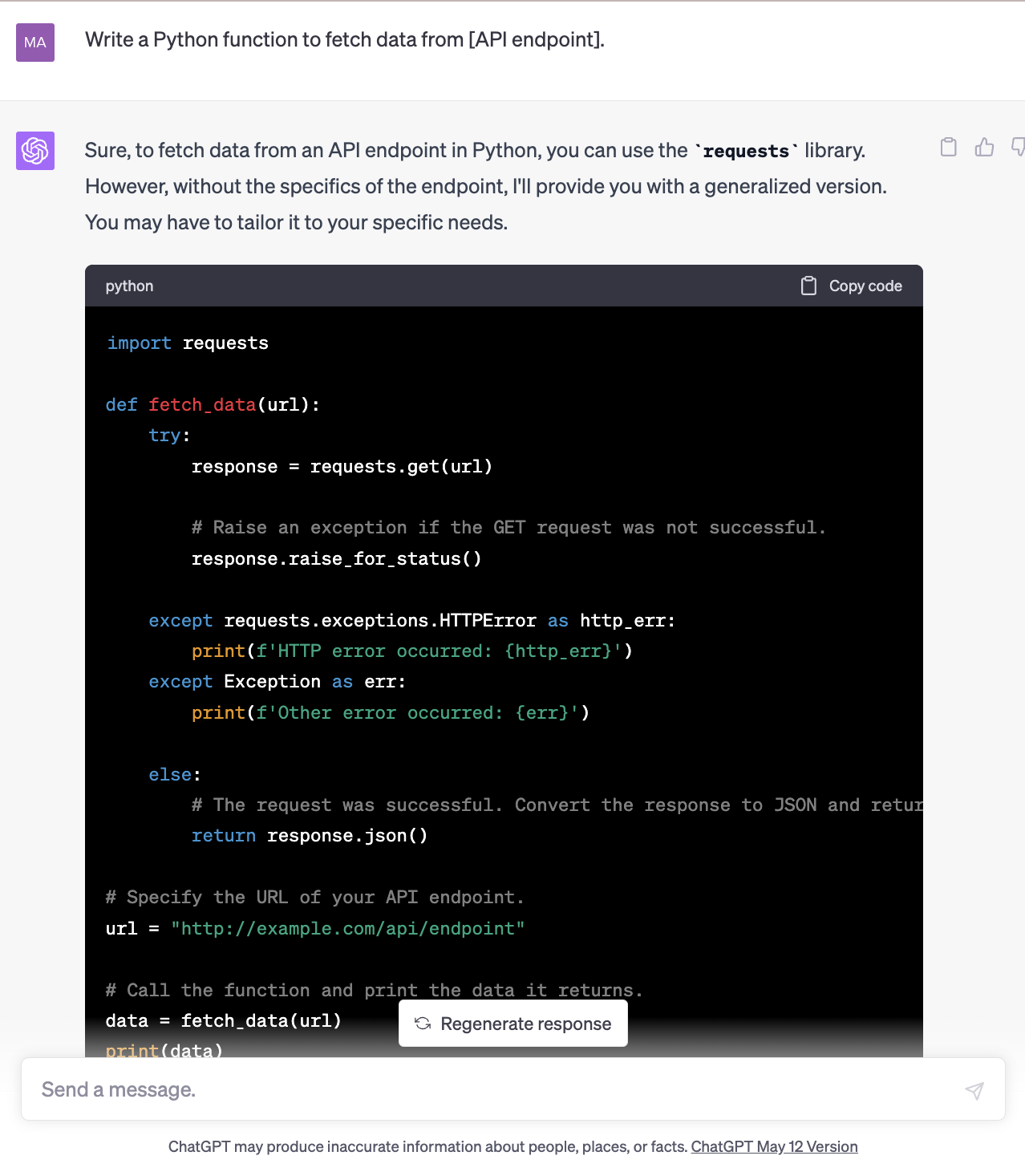
4. Improved Testing: AI can streamline the app testing process by quickly identifying bugs and vulnerabilities. It can simulate a variety of user interactions and scenarios, ensuring a thorough testing process.
5. Cost and Time Efficiency: With AI, many aspects of app development can be automated, reducing the time to market and lowering development costs. This efficiency can give developers a competitive advantage in the rapidly evolving app market.
6. Reasoning Assistance: AI enables developers to better anticipate what will satisfy customer needs. By utilizing AI, developers can prioritize client needs and significantly enhance user experience.
Advantages for Organizations & Users
1. Personalized User Experience: AI’s ability to learn from a user’s behavior and preferences allows apps to deliver a highly personalized experience. From customized content and notifications to personalized product or service recommendations, AI enables apps to become more user-centric.
2. Predictive User Behavior: AI algorithms can anticipate user needs and behaviors based on past activity and trends. This leads to proactive suggestions, enhancing user engagement and satisfaction.
3. Automated Tasks: AI can automate routine tasks within the app, saving users time and effort. For instance, AI can automate calendar scheduling, email sorting, and even social media updates.
4. Intelligent Assistance: Advanced AI chatbots can handle complex conversations, providing real-time assistance to users. They can guide users through app navigation, answer queries, and even carry out transactions.
5. Efficient Problem-Solving Techniques: AI can help with problem-solving. When implemented in apps, it enhances their ability to find solutions, making the applications more robust and efficient. AI-driven algorithms can analyze human behavior and leverage data analytics to foster improved decision-making.
6. Ease of Completing Repetitive Tasks: One of the more frustrating aspects for users is undertaking repetitive tasks. AI tackles this issue head-on by automating repetitive actions, enhancing the overall user experience and efficiency.
7. Intelligent Search Engines: AI services have revolutionized search engines, delivering results tailored to user preferences and expectations. Incorporating machine learning and AI can vastly improve the user experience, as it allows image and voice recognition features for more intuitive searches.
8. Data-driven Content: By employing robust analytics, AI sifts through vast amounts of data to facilitate dynamic content creation that resonates with users. For example, AI’s ability to implement Optical Character Recognition (OCR), it translates content across various languages, thus enabling your app to connect with a global audience effectively. This personalized, data-centric content caters to user tasks in their preferred language, enhancing user experience and promoting app digitization.
9. Interactive UI: AI significantly improves the user interface of your app, contributing to superior performance. You may have observed chatbots popping up in many apps, all aimed at enhancing customer service. This allows the app to better understand and cater to user needs.
10. Revenue Boost: As user satisfaction increases with improved AI-driven app experience, there’s a corresponding increase in revenue. Brands that provide a superior AI-enhanced experience are more likely to witness higher customer engagement and increased sales.
In essence, AI’s incorporation into app development leads to more efficient and user-friendly apps, which drives business success.
Why AI is a game changer for your business and your apps
AI plays a wide range of roles in creating mobile apps, frequently acting as the keystone for a smooth user experience, greater productivity, and overall enhanced app functioning. AI fundamentally alters the app development scene with its cutting-edge innovation, personalization capabilities, data-driven forecasts, picture and speech recognition features, and automation effectiveness. In order to create smarter, more intuitive, and user-centered mobile apps, AI will continue to play a crucial role in mobile app development as we prepare for a future with more sophisticated technology.
AI is no longer simply a trendy phrase; it is the foundation of cutting-edge mobile app development. It powers personalization, powers chatbots, enables predictive analysis, recognizes speech and pictures, and automates repetitive operations. Let’s investigate how these AI aspects are influencing the world of mobile app development.
Role of artificial intelligence in mobile app development
The role of artificial intelligence in mobile app development extends to several areas that enhance the overall user experience, making apps smarter, more intuitive, and more effective.
Personalization
AI enables apps to learn from user behavior and preferences, allowing them to deliver a personalized experience. This might include customizing the app’s interface for each user, suggesting relevant content or products, or even adjusting the app’s functions to suit the user’s routine.
Chatbots
AI-powered chatbots have become a crucial aspect of customer service in app development. They are capable of understanding and responding to user queries in real-time, thereby improving engagement and satisfaction. Moreover, the continuous learning capability of AI allows chatbots to become more effective over time.
Predictive Analysis
AI’s capability to analyze past behavior, trends, and patterns enables it to predict future outcomes. For example, predictive analytics in an app can suggest products a user might like, anticipate user needs, or even detect and mitigate potential security threats.
Image and Voice Recognition
AI has enabled apps to recognize images and voice, making user interactions more diverse and natural. For instance, a user can now upload an image to a search engine to find similar images, or use voice commands to control an app, enhancing usability and accessibility.
Automate Tasks
AI has the power to automate repetitive tasks within an app, such as data entry, account syncing, or regular updates. This not only improves the app’s efficiency but also allows developers to focus on more critical tasks, thus enhancing their productivity and app experience.
Before we explore the ways that Fliplet is utilizing artificial intelligence in app development, it’s essential to take a step back and appreciate the transformative role AI has assumed in the mobile app development landscape. The intricate blend of AI with mobile apps has fundamentally revolutionized how users interact with digital platforms, lending a smarter, more intuitive, and more effective dimension to these applications.
Whether it’s the aspect of personalization, the convenience offered by AI-powered chatbots, the foresight enabled by predictive analysis, the interactive novelty of image and voice recognition, or the productivity enhancement achieved through automation, AI’s role in app development is nothing short of remarkable. These game-changing applications of AI are not just enhancing the user experience but also setting the stage for a more advanced and innovative future in mobile app development.
With this understanding, let’s delve into how Fliplet, a no-code/low-code mobile application platform, is harnessing the power of AI, as discussed in a recent webinar.
Harnessing the Power of AI in App Development with Fliplet
Fliplet is a no-code/low-code mobile application platform that enables organizations to create iOS and Android apps without any coding. Fliplet has enabled individuals and enterprise organizations to create mobile and web apps.
Fliplet is now opening new doors for app development thanks to its creative approach to utilizing AI’s capability. To increase the impact of AI, other ground-breaking tools and technologies have also surfaced, one of which is ChatGPT.
Watch this webinar to understand the latest Fliplet AI features and use cases
Fliplet achieves those amazing results by integrating ChatGPT and Open AI to its core functionality.
Integrating ChatGPT to your app development process allows you to speed up the development phase, automate conversational chores, and greatly improve your app’s usability, effectiveness, and user engagement. However, there are a few drawbacks to be aware of like with any advanced technology. Let’s examine ChatGPT’s operation and the benefits and drawbacks of using it in the creation of mobile applications.
Introduction to chatgpt
When you ask Chat GPT ‘What is Chat GPT’, here are the results:
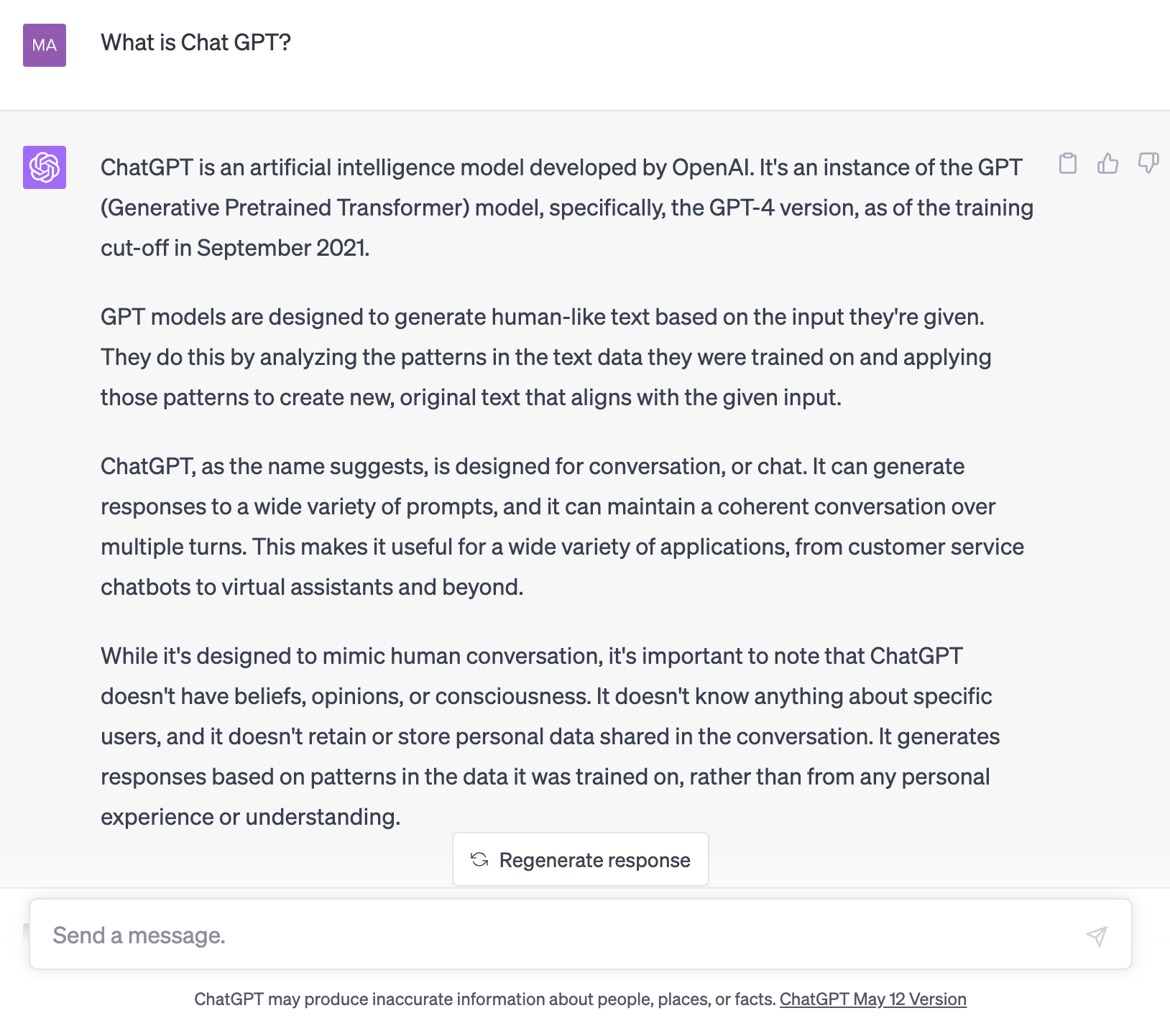
How can it help develop apps quickly?
Integrating ChatGPT into app development can offer numerous advantages. It can speed up development by providing automated conversational capabilities, eliminating the need for manual scripting of dialogue or responses. You can employ it for various functionalities, from customer service chatbots and interactive voice assistants to content generation tools. As it continually learns and improves, it can help keep your app up-to-date with minimal maintenance effort.





ChatGPT’s Pros
- Natural language understanding: A standout advantage of employing ChatGPT in mobile app development is its adeptness in comprehending and reacting to natural language inputs. This feature facilitates more organic interactions between the app and the users, leading to a more immersive and enjoyable user experience. Developers can utilize ChatGPT to craft chatbots or voice assistants that can intelligently respond to user’s queries expressed in their everyday language.
- Continuous learning capability: ChatGPT, as a machine learning model, possesses the remarkable capability to learn from user interactions. This continuous learning ability allows it to progressively improve its performance over time, enhancing its precision and efficacy in processing user inputs and providing responses. This results in continuous improvements to user engagement and overall app experience.
- Advanced search functionality: One major benefit of ChatGPT in mobile app development lies in refining the app’s search functions. Thanks to its proficiency in processing natural language queries, ChatGPT can be employed to construct robust, accurate search algorithms. These algorithms allow users to rapidly and effortlessly locate the information they need within your app.
- Complex interaction handling: Another notable feature of ChatGPT is its ability to manage complex, multi-step interactions. With a sound understanding of conversational context, ChatGPT can keep track of user’s intent across multiple interactions, making conversations feel more organic and less mechanical.
- Personalized content generation: ChatGPT’s text generation capability can also be exploited to deliver personalized content, recommendations, and other tailored features to enhance user engagement. For example, a mobile app powered by ChatGPT can suggest new books to a user based on their reading history or recommend recipes according to the user’s dietary preferences, thus creating a uniquely personalized experience.
Take a look at this video where Ian Broom, CEO at Fliplet gives you three ways to achieve 10 times faster results with AI.
Chat GPT’s Cons
- Data privacy concerns: As ChatGPT interacts with users in an app, it might need to process sensitive or personal information. This can raise data privacy and security concerns, especially if not handled properly. App developers need to ensure robust data handling and privacy measures are in place, which can add to the complexity of app development and maintenance.
- Internet dependency: Applications that heavily rely on ChatGPT require constant and robust internet connectivity for optimal functioning. For apps targeting areas with inconsistent internet access, this can limit the usability of the app and subsequently impact the user experience.
- Challenges in handling ambiguities: While ChatGPT can effectively handle natural language processing, it may sometimes struggle with ambiguous queries or complex user inputs. This can pose a challenge for app developers, as it might lead to inaccuracies in responses or actions, thereby affecting the overall user experience within the app. In such scenarios, developers might need to invest more resources into refining and troubleshooting AI-based interactions.
Imagine building apps faster, more efficiently, and more accurately than ever before, benefiting your organization and app users. The potential of AI in app development is truly limitless.
In summary, ChatGPT is a revolutionary tool in app development, offering fast, sophisticated, and continually improving conversational capabilities. However, developers must implement and manage it responsibly to make the most of its potential.
Top 6 AI Prompts that will help you accelerate your AI App Development (includes Screenshots)
As we mentioned above in the limitations there are some risks when using AI. Do not share personal data and information with AI as you do not know how it will be used. AI can also be bias, so you should always reference check that what it says is correct.
1. Ask AI to help you retain users
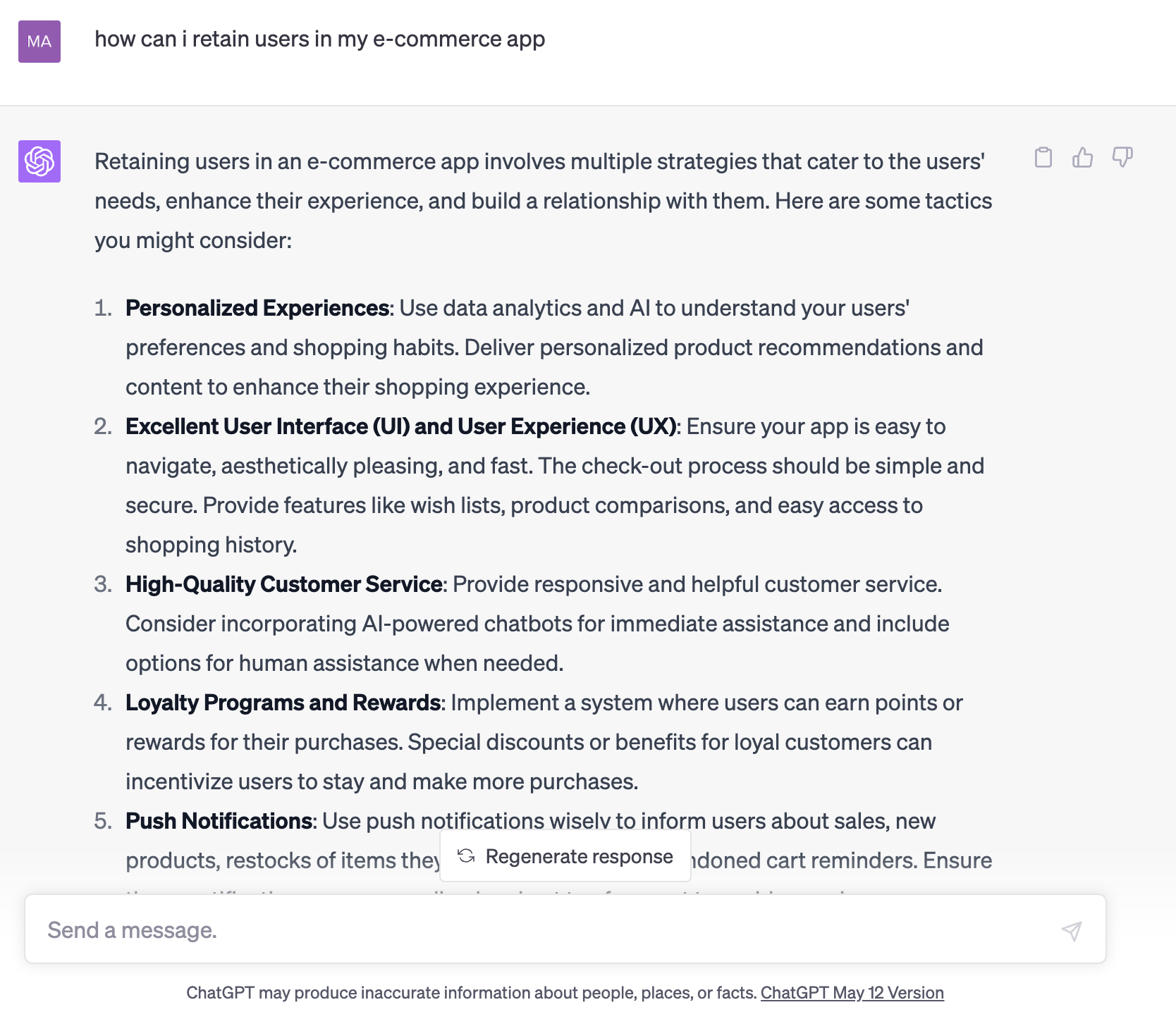
2. Ask AI to create a marketing app plan for you
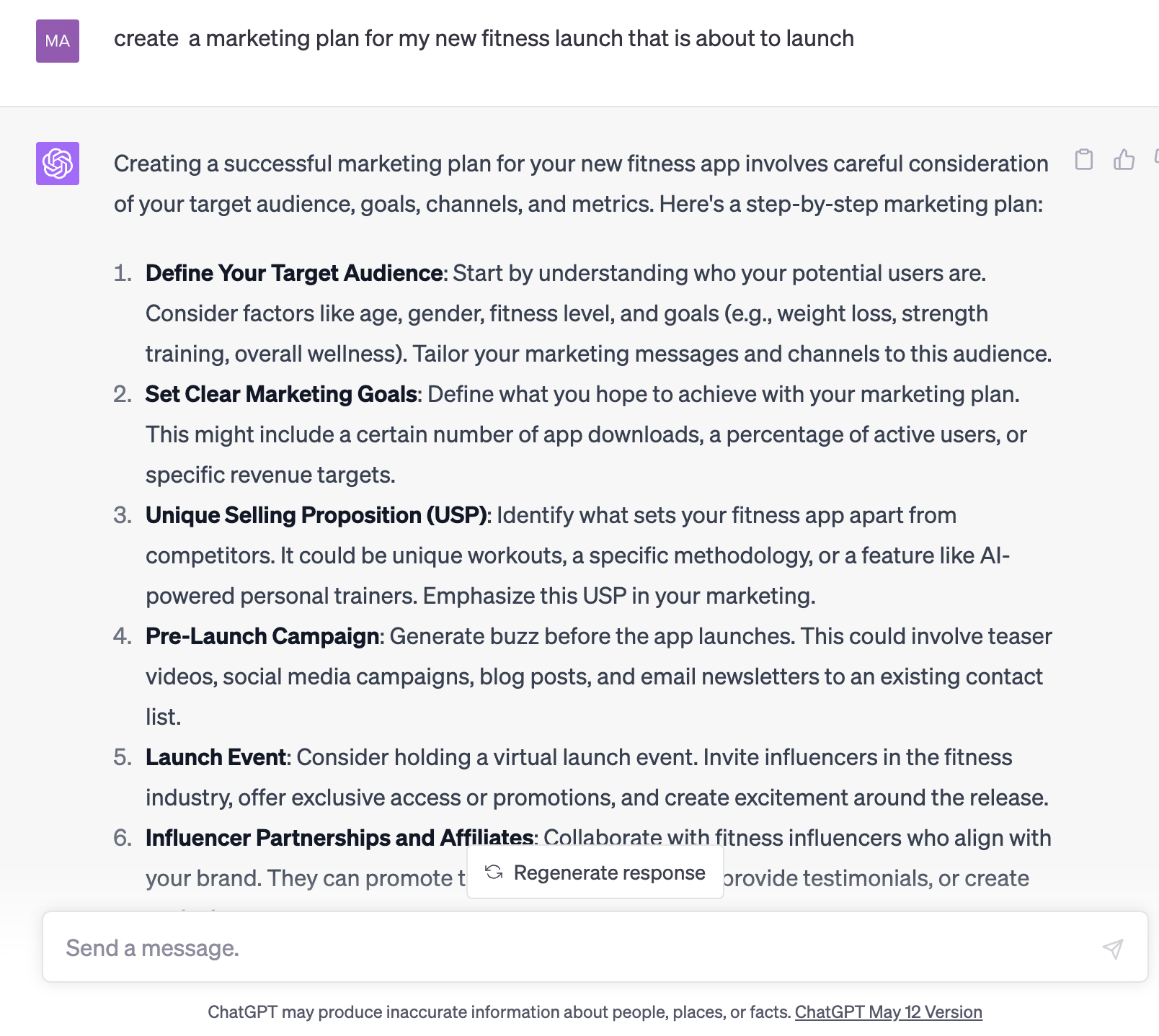
3. Ask AI to translate for you
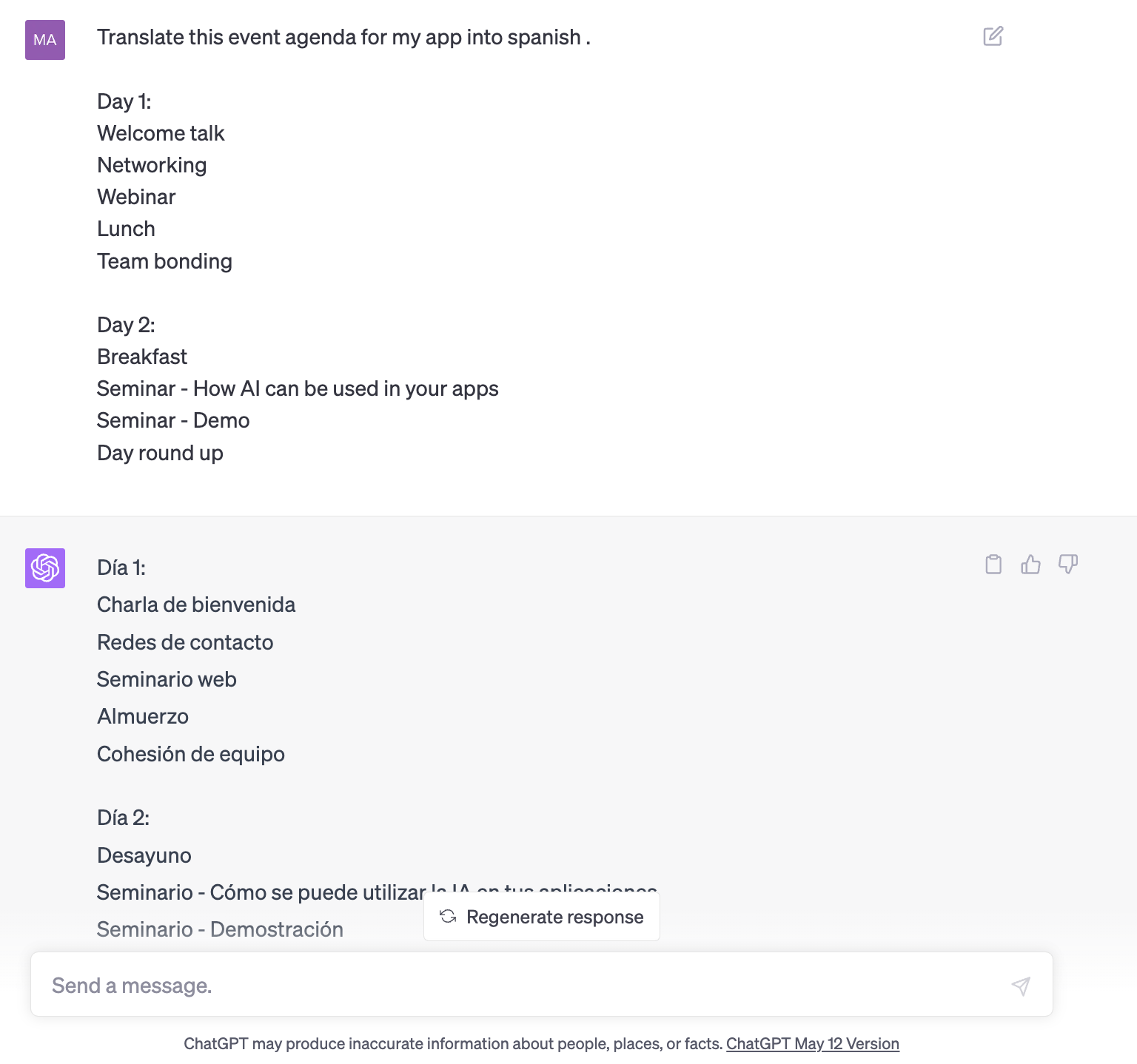
4. Ai can create content for you
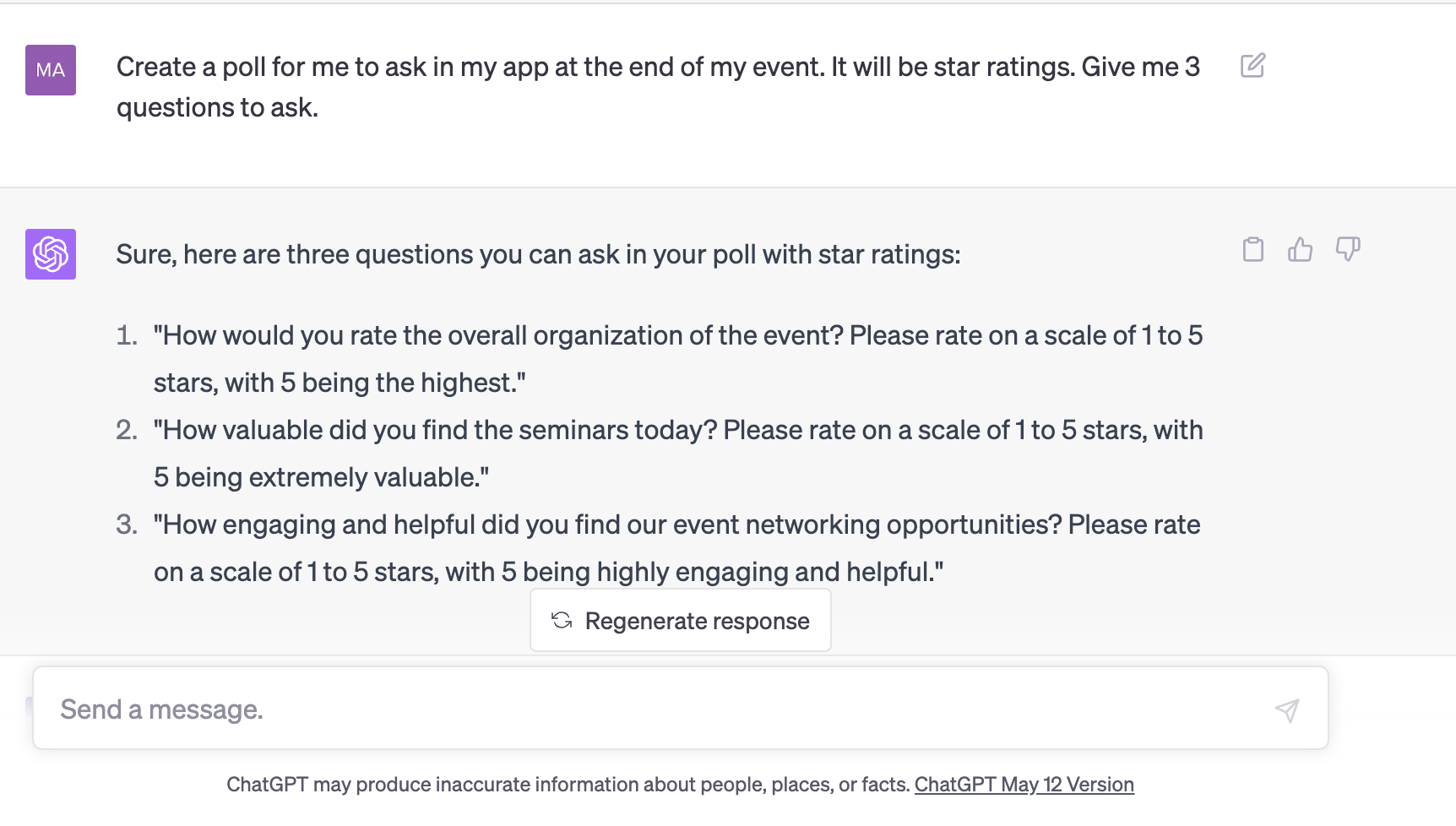
5. Analyze app data and make recommendations
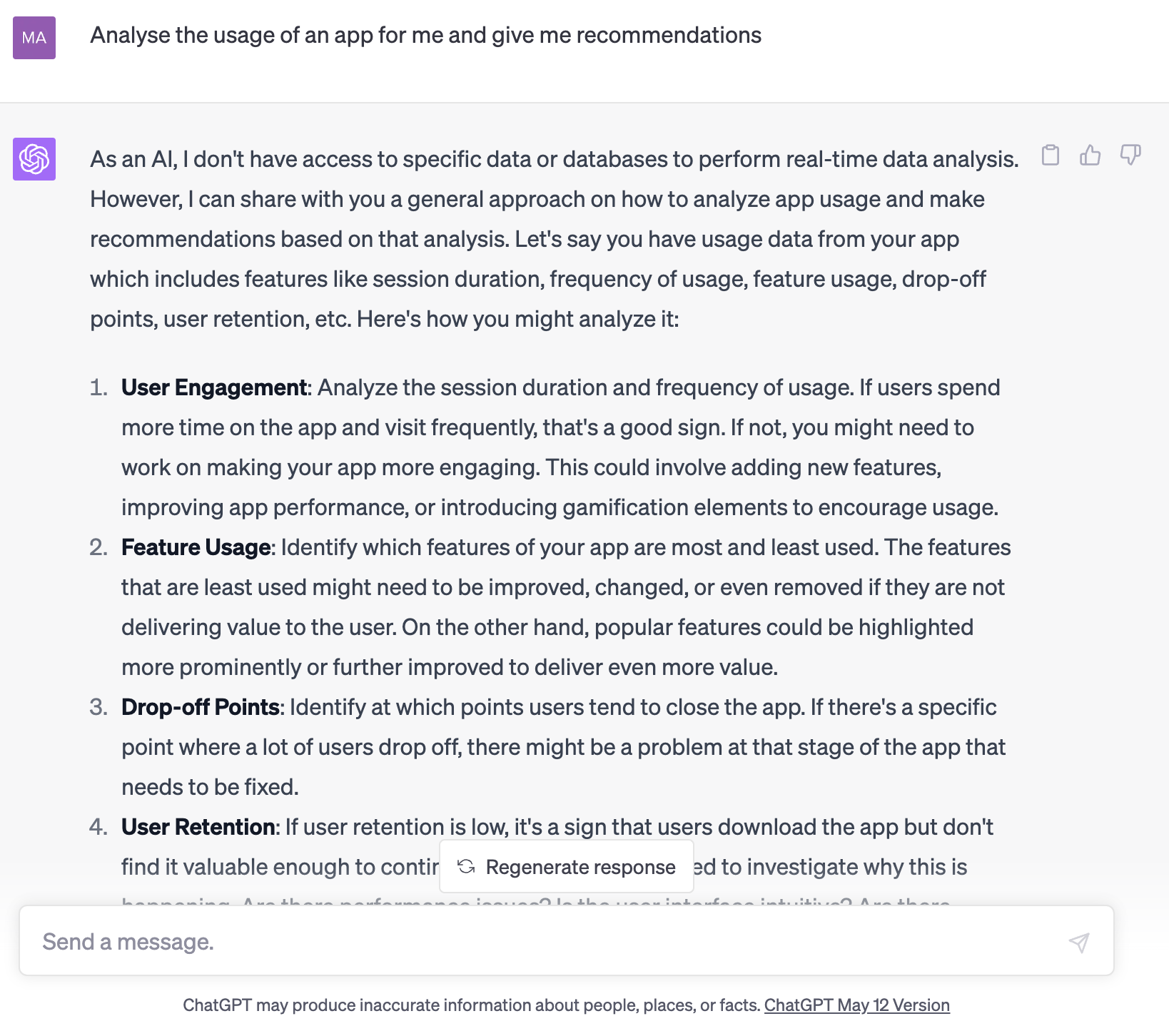
6. Code generation
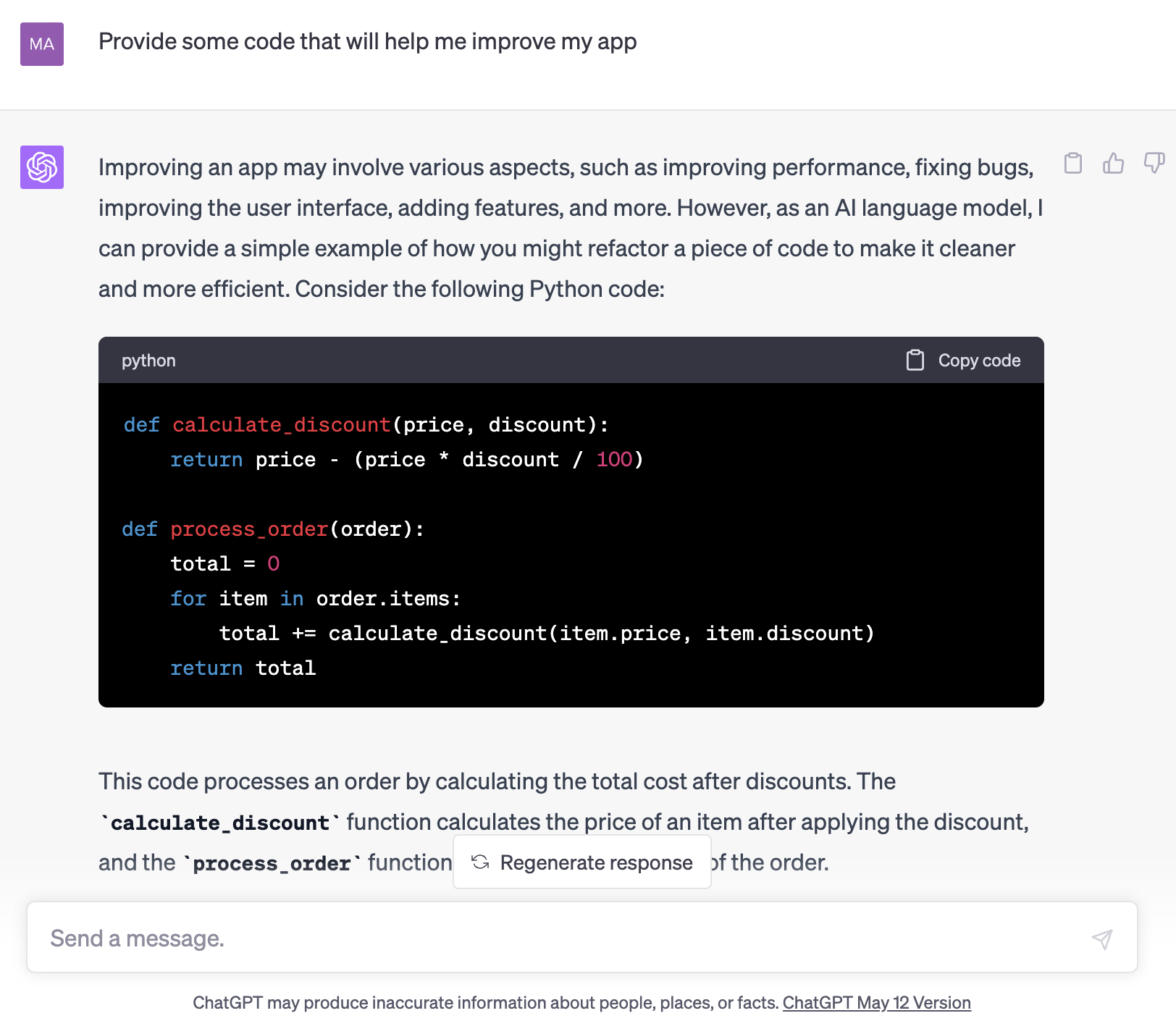
How AI App Development is Shaping Various Industries
The role of AI in mobile app development has become pivotal, extending its influence across various industries. From healthcare to ecommerce, finance, education, and legal sectors, AI app development is breaking new ground. AI-driven strategies are revolutionizing user experiences, streamlining operations, and driving industry growth.
Healthcare
AI app development is transforming the healthcare industry by enabling personalized patient care and improving diagnostics. AI-powered apps can track health metrics, provide virtual consultations, automate appointment scheduling, and even assist in predictive analytics to anticipate health issues before they arise.
For example, AI can help doctors interpret medical imaging, predict patient deterioration, and suggest personalized treatment plans.Read our ultimate guide on healthcare application development to help you get started with your app journey.
If you want to know more about the trends for app solutions in the healthcare industry then sign up to our webinar for free.
Ecommerce
In the ecommerce sector, AI apps are enhancing the shopping experience by offering personalized product recommendations, smart search features, and chatbots for improved customer service. AI can also aid in inventory management, predicting demand, and optimizing pricing strategies. Apps with image recognition can allow users to search for products using pictures, while AI-powered personal assistants can help with purchase decisions. Start building your eCommerce app for free with Fliplet.
Finance
Financial institutions are leveraging AI apps for fraud detection, risk assessment, customer service, and personalized financial advice. These apps can provide real-time analytics, automate routine tasks, and help users manage their personal finances. AI can also aid in regulatory compliance by continuously monitoring transactions and flagging suspicious activities.
Education
AI is reshaping the education industry with apps that offer personalized learning experiences, automate grading, provide instant feedback, and even monitor student progress. AI can help develop adaptive learning platforms that adjust the difficulty level based on the learner’s proficiency. AI-powered chatbots can also assist students with queries and improve engagement.
If you are interested in making a learning app take a look at our blog on how to make a learning app on a budget or, check out our Learning solution.
Legal
AI apps in the legal field can help automate repetitive tasks like legal research, contract analysis, and document review. AI can assist in predicting legal outcomes, which can be particularly useful in case preparation. Additionally, chatbots can answer simple legal questions, improving accessibility to legal information.
In each of these industries, AI app development not only provides an enhanced user experience but also drives operational efficiency and facilitates informed decision-making. With the right application of AI, businesses can gain a competitive edge in their respective markets.
Register for free to our webinar on how the top 200 law firms use apps, or check out our blog on the 14 best apps for lawyers.
The Future of AI in App Development: Emerging Trends and Predictions
The dynamic field of AI app development is set to revolutionize the way we interact with digital platforms. As AI continues to mature, we foresee several emerging trends that could profoundly reshape the app development landscape.
Emerging AI trends
Incorporation of Machine Learning in App Development
Machine learning, a subset of AI, has shown tremendous potential in driving innovation in app development. By using algorithms to analyze and learn from data, machine learning enables apps to automatically improve performance without explicit programming.
For instance, personalized recommendations in streaming or shopping apps are powered by machine learning algorithms that learn from user behavior and preferences. In the future, we can expect to see an increasing number of AI apps leveraging machine learning to provide intuitive, personalized experiences.
Predictive Analytics
By using historical data, statistical algorithms, and machine learning techniques, predictive analytics can forecast future outcomes. In the realm of app development, this could translate into apps capable of predicting user needs and preferences, thereby enhancing user experience. Future AI apps might anticipate user actions, offer personalized suggestions, or proactively address potential issues before they arise.
Voice and Image Recognition
The future of AI app development will also witness advancements in voice and image recognition technologies. Apps will become more interactive, responding to voice commands and recognizing images with increased accuracy. This could revolutionize various sectors, from enhancing accessibility options to offering new ways of interacting with apps.
Impact on the App Development Industry
These AI trends promise a profound impact on the app development industry. Some AI predictions include:
1. Shift in User Expectations: As AI apps become mainstream, users will come to expect the heightened personalization, intuitiveness, and interactivity they offer. App developers will need to incorporate AI to meet these evolving expectations.
2. Increased Demand for AI Expertise: The increasing importance of AI in app development will drive demand for developers with AI and machine learning expertise.
3. New Business Opportunities: AI opens up new possibilities for app functionality, creating opportunities for innovative apps that can disrupt existing markets or create entirely new ones.
4. Greater Complexity in App Development: As AI gets incorporated into more apps, the complexity of app development will increase. Developers will need to understand how to incorporate AI algorithms, manage large volumes of data, and address new security challenges.
5. Necessity of Continuous Learning: AI is a rapidly evolving field. As such, developers and app development companies will need to commit to continuous learning to stay updated with the latest AI technologies, techniques, and best practices.
6. Emergence of New Roles: As the industry leans more into AI, new professional roles will emerge. We will see a growing demand for AI specialists, data scientists, and machine learning engineers in the app development field.
7. Increased Focus on Data Management: The effectiveness of AI depends heavily on the quality of data used to train it. As a result, there will be a greater focus on data collection, management, and analysis within the app development process.
8. Enhanced App Testing: With AI elements integrated into apps, the process of app testing and quality assurance will become more complex. New strategies and tools will need to be developed to effectively test AI functionality within apps.
9. Ethical and Regulatory Considerations: The integration of AI into apps will bring ethical and regulatory considerations to the forefront, including issues around data privacy, AI bias, and transparency. This will necessitate new guidelines and regulations to ensure the responsible use of AI in app development.
In conclusion, the future of AI app development is a thrilling vista of advanced machine learning, predictive analytics, and increased interactivity. As these technologies continue to evolve, the boundary between user and app will become increasingly seamless, creating a more intuitive, engaging, and satisfying user experience. With AI leading the charge, the future of app development promises to be an exciting journey of continuous innovation and transformation.
To find out more on the trends and impact of AI sign up to our Fliplet Summit keynote presentation.
Conclusion
In conclusion, artificial intelligence plays a significant and far-reaching role in the creation of mobile apps. AI has a significant and broad influence on a variety of industries, including healthcare, e-commerce, banking, education, and law, by personalizing user experiences and enhancing operational efficiency. AI helps developers to create apps that are more user-centric and intuitive by providing smart functions, such as predictive user experiences, sophisticated AI chatbots, task automation, and hyper customization.
Additionally, tools like Fliplet are making it even simpler for businesses to use AI to build better apps without having to have a deep understanding of coding. With real-time, human-like conversational skills and multilingual support, ChatGPT and other AI models that are capable of continuous learning and adaptation raise the bar for app development.
However, it’s essential to remember that while AI offers remarkable benefits, it also requires careful implementation and continuous monitoring to ensure it serves its intended purpose effectively and responsibly. Please note, when using AI do not share personal data with it as you do not know where this information will go.
Looking forward, we can anticipate that as AI technology becomes even more advanced and accessible, its role in enhancing mobile app user experience will continue to evolve, shaping the future of mobile app development. The key to navigating this exciting digital frontier lies in harnessing the full potential of AI responsibly and creatively.
To find out more about Fliplet you can request a demo or try it for free.
FAQs
Can I use AI to develop an app?
Yes, you can use AI to develop an app. AI can greatly enhance app functionality and user experience, enabling features such as personalized recommendations, voice recognition, image recognition, chatbots, and much more. However, developing an AI-powered app requires knowledge of AI and machine learning principles, algorithms, and relevant programming languages.
How do I create an AI mobile app?
Creating an AI mobile app involves several steps, and each requires specific knowledge in software development and AI technologies. Here’s a basic outline of the process:
- Define the App Idea and Objectives: First, determine what kind of AI app you want to develop and what problems it aims to solve. Consider the needs of your target audience and how AI can enhance user experience or provide unique functionalities.
- Research and Plan: Research the market, competitors, and latest AI trends relevant to your app idea. Formulate a plan detailing the app features, design, development process, timeline, and budget.
- Choose the Right AI Technologies: Depending on your app’s requirements, you might need various AI technologies such as machine learning, natural language processing (NLP), computer vision, or chatbots. You might also consider using AI platforms or APIs (like IBM Watson, Google’s ML Kit, Microsoft Azure Cognitive Services, etc.) to integrate AI functionalities without starting from scratch.
- Design the App: Design the user interface and experience (UI/UX) of the app. It’s important to make the app intuitive and user-friendly, even with complex AI features.
- Develop the App: This is where you, or your development team, start coding. If you’re using an AI API, you’d need to integrate it with your app during this stage. If you’re building the AI functionality from scratch, you’d need to code the algorithms or train the AI models.
- Testing: Thoroughly test the app and its AI functionalities for any bugs or issues. You also need to ensure that the AI features work effectively and provide value to the user.
- Deployment and Maintenance: After testing, you can launch your app. However, the work doesn’t stop here. You need to continuously monitor the app, fix any arising issues, and update it based on user feedback and evolving needs. For the AI part, this might involve retraining or fine-tuning your models to maintain their performance.
Remember, creating an AI app can be a complex process, especially if you’re new to AI and app development. You might need to collaborate with AI specialists, data scientists, or a professional app development team. Additionally, consider potential ethical implications, data privacy and security concerns related to AI apps.
How much does it cost to build an app with AI?
The cost of building an AI-based mobile application varies significantly depending on several factors:
- Complexity and Functionality: The more complex the AI functionality is, the higher the cost will be. A basic app with simple AI features (like a chatbot) may cost less compared to an app that uses more complex AI technology (like deep learning, image recognition, or predictive analytics).
- AI Model Training: The cost of training an AI model can add significantly to the budget. This process involves acquiring, cleaning, and labeling data, which can be time-consuming and expensive.
- Development Approach: If you’re using pre-trained AI models or APIs, the cost might be lower compared to building AI capabilities from scratch. However, subscription costs for these platforms (such as IBM Watson, Google Cloud AI, or Microsoft Azure) need to be taken into account.
- App Design: An app with high-quality UI/UX design may require a higher budget.
- Location and Team Size: The cost can also depend on where your development team is based, as rates vary across different countries. The size and expertise level of the team will also impact the overall cost.
- Maintenance and Updates: The initial development of the app is not the only cost. Continuous app maintenance, updates, and possibly further AI model training should also be factored into the budget.
Given these variables, it’s difficult to provide a specific cost. However, a simple AI application might start in the range of $5,000 to $20,000, while a more complex application can cost more. You can also use free AI tools that we have listed in this blog. Always consider getting an estimate from a professional app development team based on your specific needs and budget.
Can I build an AI on my own?
Yes, it is possible to build an AI system on your own, but the process can be complex and requires a fair amount of technical expertise. Here are the general steps you would follow:
- Learn About AI and Machine Learning: If you’re starting from scratch, you’ll need to understand the basics of AI and Machine Learning (ML). There are numerous free and paid resources available online, including courses from platforms like Coursera, edX, and Udacity.
- Choose a Programming Language: Most AI and ML systems are built using programming languages like Python, R, or Java. Python, in particular, is widely used because of its simplicity and the availability of numerous AI and ML libraries like TensorFlow, PyTorch, and Scikit-learn.
- Understand the Math Behind AI: AI and ML rely heavily on concepts from statistics, algebra, and calculus. Having a solid understanding of these areas will help you build more effective AI models.
- Choose the Right Tools and Frameworks: There are many tools and frameworks available that can simplify the process of building AI systems. These include TensorFlow, Keras, and PyTorch. Each has its own strengths and weaknesses, so you’ll need to choose the one that best fits your needs.
- Get Hands-On Experience: The best way to learn is by doing. Try working on some small projects or participating in AI competitions on platforms like Kaggle. This will give you practical experience in building AI systems.
- Collect and Prepare Your Data: AI systems need data to learn from. You’ll need to collect relevant data for your AI, clean it (remove irrelevant information, deal with missing values, etc.), and possibly annotate it (for supervised learning tasks).
- Train Your AI Model: Using your chosen programming language and framework, you’ll need to implement and train your AI model. This involves feeding your data into the model and adjusting the model’s parameters so it can learn from the data.
- Evaluate and Tune Your Model: Once your model is trained, you’ll need to evaluate its performance and fine-tune its parameters to improve accuracy.
- Deploy Your Model: The final step is deploying your model to a production environment. This can be a complex process depending on your use case and requires careful consideration of factors like scalability, security, and performance.
It’s worth noting that while it’s possible to build an AI on your own, building a sophisticated AI system can be a huge task for one person. If you’re planning to develop a complex AI, consider seeking help from others with complementary skills or consider outsourcing some or all of the work to a specialized AI development company.
Contents
2
3
